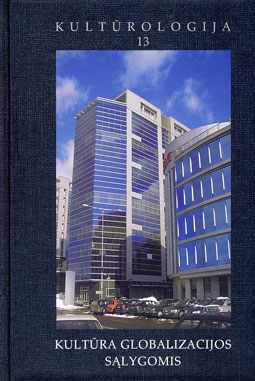Gyvenimas globalioje informacinėje visuomenėje: kūnas, erdvės, bendruomenės
Life in Global Informational Society: Body, Spaces, Communities
Author(s): Virginijus SavukynasSubject(s): Cultural Essay, Political Essay, Societal Essay
Published by: Lietuvos kultūros tyrimų
Keywords: Lithuania; globalization; informational society; body; spaces; communities
Summary/Abstract: The article analyzes several aspects of the global web society including the relation between a body (and its absence on the Internet) and space, and the conditions for the establishment of virtual communities. In this article, the author argues that the appearance of the Internet has been connected to the archaizing of culture (of course, we don't have in mind a real return to the state of the pre-modern culture). Talking of modernization, the Lithuanian sociologist Vytautas Kavolis suggested that we should understand it in a broader way as a process that takes place on several levels and that moves towards the opposite directions at the same time. Therefore, he considers not only modernizing forces (individualism, historicism, rationalism, universalism and humanization) but also antimodernity (the inversion of the mentioned values), archaization and postmodernism (Kavolis 2005 2-9). Postmodernism and archaism emerge as the attempts to unite what the process of modernization had disjointed. We should emphasize that this archaism does not correspond to the premodern archaism but it has been created as a result of modernization. It is a construct of modernization. It is this V. Kavolis's idea that I will borrow in attempting to describe the chosen aspects of the information society. The Internet archaizes culture, i. e. revives some cultural forms expelled by modernization. We all know that the Internet offers a huge amount of information. However, the issue of confidence and trust always arises with regard to this information. In this environment, gossip, namely unreliable but from the first sight compelling information, can proliferate. This information can be comprised of unspoken phrases, undelivered speeches or unwritten articles attributed to a certain famous person. The Internet created conditions for the easy dissemination of untested information that might not correspond to the reality. If, in the traditional society, gossip was transmitted orally, currently it travels from one mailbox to another.The Internet revives another phenomenon that can be called Internet folklore: various stories, anecdotes, pictures, short videos, etc. moving from one mailbox to another. They are authorless; they survive only until they are transmitted and shared, i. e. until they function in the virtual communities. This way of their functioning reminds of the functioning of folklore. Orality is also characteristic of the Internet culture. The neolanguage prevalent on the Internet (it can be said not only of the English language but also of other languages including Lithuanian) denies the rules of a written language without changing the structure of a spoken language. For instance, on the Internet, "for you" is transformed into "4U." Words and phrases that don't make sense acquire meaning when we read them aloud. Thus, this written discourse refutes, in a sense, the culture of writing...
Journal: Kultūrologija
- Issue Year: 2006
- Issue No: 13
- Page Range: 29-47
- Page Count: 18
- Language: Lithuanian

